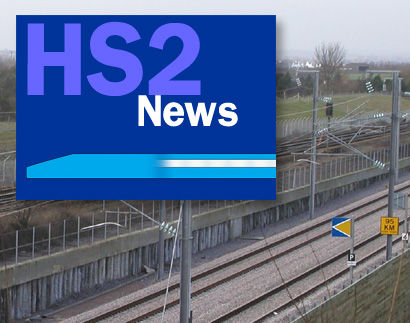A THINK TANK which promotes 'free market' principles has predicted that the cost of building HS2 could rise to £80 billion, and concludes that the project should therefore be scrapped.
The Institute for Economic Affairs has published a report claiming that costs of the High Speed line are set to almost double from the present official estimates, partly because of the requirement to build more of the route in tunnel to placate protestors who live nearby. 'Lobbying from local authorities for new links to HS2 stations' is also said to be boosting costs.
However, the IEA has been accused of presenting a partisan view which is in line with its general policy of opposing major publicly-funded projects in favour of allowing the market to decide.
The report -- called the 'High Speed Gravy Train' -- claims that ministers appear to have disregarded the economic evidence 'and have chosen to proceed with the project for political reasons'. Its author, Dr Richard Wellings, said it was 'time the government abandoned its plans'.
He also alleges that 'a group of powerful special interests appears to have had a disproportionate influence on the government’s decision to build HS2'. This is partly because engineering firms which can expect contracts to build the line have joined the 'pro' lobby, according to the Institute. It goes on to explain that 'an effective lobbying campaign in favour of HS2 was initiated and funded by concentrated interests expecting to make economic gains from the project. This effort appears to have been effective at marshalling support for the scheme among policymakers'.
In a related development, Major Projects Authority head David Pitchford has told the Daily Telegraph that HS2 is likely to stay on an “Amber-Red” rating for now. However, the reasons for this conclusion have been kept confidential.
Joe Rukin of StopHS2 said: "The Information Commissioner has been very clear, the details of why the Major Projects Authority think HS2 is a disaster waiting to happen must be released, both in the public interests and to comply with environmental legislation, but that is not good enough for a Government who want to make sure their consistent incompetence on HS2 remains buried. It is a disgrace that MPs weren’t told just how badly HS2 has been managed before they were asked to vote on a blank cheque for it. It is not in the public interests and completely undemocratic to withhold this information.”
Supporters of HS2 have been quick to respond. Emma Antrobus of the Greater Manchester Chamber of Commerce said the nation was 'suffering from decades of under-investment' in transport, and that HS2 will 'free up enormous amounts of capacity on the current rail network', as well as improving connections between cities.
The Department for Transport said that HS2 was 'absolutely vital', providing a 'huge economic boost which will generate a return on investment that will continue paying back for generations to come'.
A spokesman continued: "Without it, the key rail routes connecting London, the Midlands and the North will be overwhelmed. HS2 will provide the capacity needed in a way that will generate hundreds of thousands of jobs and billions of pounds worth of economic benefits.
"The Government is committed to managing the cost within the budget we have set for the project and to securing maximum value for money for the taxpayer, while also ensuring that preparations are properly made for the most significant infrastructure investment the UK has seen in modern times."
Development company HS2 Ltd cast doubt on the IEA's motives, claiming that 'the approach has clearly been designed to suit its aims and those of its funders to dismiss any major government project'.


